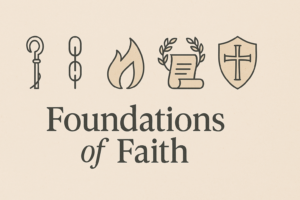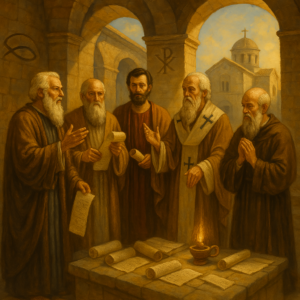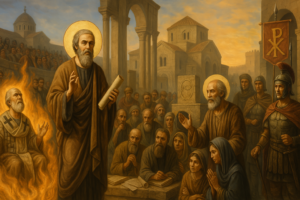Estimated reading time: 10 minutes
Key Takeaways
- The early church fathers were pivotal in shaping foundational Christian doctrines.
- Understanding their teachings can deeply transform and enrich modern faith practices.
- Their writings provide a direct link to early Christian beliefs shortly after the time of Jesus and the apostles.
- They addressed critical theological questions that continue to influence Christianity today.
- Studying their insights can help believers navigate contemporary faith challenges.
The early church fathers were prominent theologians and Christian leaders who shaped the foundation of Christian doctrine from the 1st to 8th century CE. These influential thinkers defended core beliefs against various heresies and helped establish the theological framework that Christians follow today.
Understanding who these early Christian thinkers were and what they taught gives us powerful insights that can transform our faith today. Their writings connect us directly to the time shortly after Jesus and the apostles, providing a bridge to early Christian practices and beliefs.
These church fathers lived during critical periods when Christianity was forming its identity. They risked their lives to preserve the truth of the gospel and clarify what Christians believe. Their dedication to doctrine continues to influence how we understand our faith today.
Through their writings, sermons, and leadership, these early theologians established the intellectual foundations that would guide Christianity for centuries to come. Their collective wisdom remains relevant for believers seeking to deepen their faith and understanding.
Early Church Fathers History and Timeline
The
early church fathers history spans several crucial centuries of Christian development. After the apostolic age ended around 100 CE, a new generation of leaders emerged to guide the growing Christian movement.
These leaders can be divided into distinct periods:
- Apostolic Fathers (90-160 CE) – Those who learned directly from or lived very close to the apostles’ time
- Ante-Nicene Fathers (160-325 CE) – Leaders before the Council of Nicaea
- Post-Nicene Fathers (325-451 CE) – Influential writers after Nicaea
- Later Fathers (451-750 CE) – Those who solidified doctrine through subsequent centuries
The apostolic fathers represented the first generation of Christian leaders after the original disciples. They focused primarily on practical concerns of Christian living and maintaining the purity of apostolic teachings. Figures like Clement of Rome, Ignatius of Antioch, and Polycarp of Smyrna belonged to this earliest group.
As Christianity spread throughout the Roman Empire, it faced increasing challenges from both external persecution and internal theological disputes. The ante-Nicene period saw church leaders defending the faith against Roman authorities and articulating Christian doctrine against competing religious ideas.
During these formative years, church fathers addressed crucial questions: Who is Jesus Christ? What is the nature of God? How should Scripture be interpreted? The answers they developed would become the foundation of Christian orthodoxy.
By the 4th century, Christianity gained legal status within the Roman Empire, which brought new opportunities and challenges. The post-Nicene fathers, including figures like Augustine of Hippo, helped formalize church practices and theology while addressing new theological controversies.
Throughout this timeline, these leaders worked to develop, defend, and propagate Christian theology in a world that was often hostile to their beliefs. Their collective efforts shaped what would become orthodox Christianity.
Apostolic Church Fathers and Their Unique Role
The
apostolic church fathers hold a special place in Christian history as the direct link between the original apostles and later Christian generations. These leaders emerged during the post-apostolic age (late 1st to early 2nd century) and worked to preserve the teachings received from Jesus’s disciples.
What made these earliest fathers unique was their proximity to the apostolic era. Unlike later theologians, many of them had direct contact with the original apostles or their immediate disciples. This connection gave their teachings special authority within the early Christian communities.
The apostolic fathers faced distinct challenges:
- Preserving accurate teaching without a fully established New Testament canon
- Establishing church structure and leadership patterns
- Responding to the first wave of persecution from Roman authorities
- Addressing early doctrinal disagreements
These leaders worked during a transitional period when Christianity was spreading beyond its Jewish roots into the wider Greco-Roman world. They had to interpret Jesus’s teachings for new cultural contexts while maintaining doctrinal integrity.
The writings of these apostolic fathers reveal a Christianity still in development but firmly rooted in core beliefs about Jesus’s divinity and resurrection. Their work laid the groundwork for future generations of Christian thinkers who would expand and systematize Christian theology.
As Christianity expanded throughout the Roman world, these apostolic fathers established patterns of worship, leadership, and doctrinal expression that would influence all subsequent Christian development. Their emphasis on apostolic succession—the idea that authority passes from the apostles to their appointed successors—became a cornerstone of church governance.
Through their teachings and leadership, these earliest church fathers helped Christianity transition from a small Jewish sect to a distinct religious movement that would eventually transform the Roman Empire and beyond.
Formation of Christian Doctrine in the Early Church
The
formation of Christian doctrine during the patristic period represents one of history’s most significant theological developments. The early church fathers played a crucial role in defining what Christians believe and how they understand the faith.
In the first three centuries, Christian doctrine developed through several key processes:
- Response to practical questions facing early Christian communities
- Systematization of apostolic teachings
- Refutation of competing religious ideas
- Resolution of internal theological disputes
When controversies arose about Jesus’s nature, the relationship between Father, Son, and Holy Spirit, or the proper understanding of salvation, church fathers carefully examined Scripture and apostolic tradition to formulate responses. These discussions led to increasingly precise doctrinal statements.
Major doctrinal disputes emerged as Christianity grew:
- Christological controversies – Debates about Christ’s divine and human natures
- Trinitarian disputes – Questions about the relationship between Father, Son, and Holy Spirit
- Soteriological disagreements – Different understandings of salvation and grace
- Ecclesiological differences – Varying views on church structure and authority
The church fathers addressed these questions through theological writings, local church councils, and eventually ecumenical councils that brought together leaders from across the Christian world. Their work established the parameters of orthodox belief.
By the end of the patristic period, Christianity had developed a robust theological framework addressing core doctrines like the Trinity, incarnation, and salvation. These theological formulations became the foundation for all subsequent Christian thought across various denominations and traditions.
What’s remarkable about this process is how the church fathers maintained continuity with apostolic teaching while developing more sophisticated theological expressions to address new questions. Their work demonstrates both faithfulness to tradition and intellectual creativity in responding to emerging challenges.
Ignatius of Antioch Writings and Contributions
Ignatius of Antioch stands as one of the most significant apostolic fathers, whose seven authentic letters provide crucial insights into early Christian belief and practice. As the bishop of Antioch in Syria during the early 2nd century, Ignatius wrote his famous epistles while being transported to Rome for execution around 108-110 CE.
Ignatius made several vital contributions to early Christianity:
- Promoted the concept of monarchical episcopacy (leadership by a single bishop)
- Emphasized the importance of church unity under episcopal authority
- Strongly defended Christ’s divinity against early heretical teachings
- Introduced the term “Catholic Church” to describe the universal Christian community
His letters reveal a passionate defender of orthodox Christianity against various challenges. Ignatius strongly opposed docetic views that denied Christ’s physical reality, insisting that Jesus truly suffered in a real human body. This emphasis on Christ’s genuine humanity alongside his divinity became a foundational Christian doctrine.
Beyond theology, Ignatius’s letters provide valuable insights into early church structure. He advocated a three-tiered ministry of bishop, presbyters (elders), and deacons, which would become the standard church governance model for centuries. His emphasis on the bishop as the central authority in each Christian community shaped church organization throughout the ancient world.
Ignatius’s willingness to embrace martyrdom also exemplified Christian commitment in the face of persecution. He famously wrote to the Romans, begging them not to intervene in his execution: “
I am God’s wheat, and I am ground by the teeth of wild beasts that I may be found pure bread of Christ.”
His theological insights on church unity, Christ’s nature, and Christian leadership continue to influence Christian thought across denominations today.
St. Justin Martyr: Christian Philosophy’s Pioneer
St. Justin Martyr represents a pivotal figure in early Christian thought as one of the first to engage Greek philosophy with Christian theology. Born around 100 CE, Justin began his intellectual journey as a pagan philosopher, studying various philosophical schools before his conversion to Christianity around 130 CE.
Justin’s life story demonstrates the intellectual appeal of early Christianity:
- Studied Stoicism, Aristotelian philosophy, Pythagoreanism, and Platonism
- Converted after an encounter challenged his philosophical assumptions
- Established a Christian philosophical school in Rome
- Martyred under the reign of Marcus Aurelius around 165 CE
As an apologist, Justin defended Christianity to both Roman authorities and intellectual critics. His most famous works include his “
First Apology” addressed to Emperor Antoninus Pius and the “
Dialogue with Trypho,” which records a debate with a Jewish scholar.
Justin’s greatest contribution was developing the concept of the Logos (Word) as a bridge between Greek philosophy and Christian revelation. He argued that Christ is the divine Logos through whom God created and sustains the universe. This concept allowed him to claim that Greek philosophers had partial access to divine truth, but that the full truth was revealed in Christ.
Justin also provided valuable descriptions of early Christian worship practices, including accounts of Christian baptism and Eucharist. His writings offer a window into 2nd-century Christian communities and their beliefs.
By engaging with Greek philosophical traditions rather than rejecting them outright, Justin established an intellectual framework that would influence Christian apologetics for centuries to come. His willingness to find truth in non-Christian sources while maintaining Christian distinctiveness became a model for later Christian engagement with culture.
Irenaeus Against Heresies: Defending Orthodox Faith
Irenaeus of Lyons emerged as Christianity’s most effective defender against early heresies, particularly Gnosticism, which threatened to undermine core Christian beliefs in the late 2nd century. As bishop of Lyons in Gaul (modern-day France), Irenaeus wrote his masterwork “
Against Heresies” around 180 CE to expose and refute these alternative interpretations of Christianity.
Irenaeus’s approach to combating heresy involved several strategic elements:
- Thoroughly documenting Gnostic beliefs to expose inconsistencies
- Demonstrating the historical continuity of orthodox teaching through apostolic succession
- Arguing for the unity of Scripture and its consistent witness to one Creator God
- Emphasizing the reality and significance of Christ’s physical incarnation
By emphasizing the unity of God’s plan from creation through redemption, Irenaeus provided a comprehensive theological framework that integrated Old and New Testaments. His insistence that salvation involves the whole person—body and soul—countered Gnostic views and established a holistic understanding of redemption that remains influential today.
Polycarp of Smyrna: Apostolic Link to Early Church
Polycarp of Smyrna represents one of the most direct connections between the apostolic age and the developing church of the 2nd century. As bishop of Smyrna, Polycarp was a disciple of the Apostle John and teacher of Irenaeus, serving as a living link in transmitting apostolic teaching to future generations.
Key aspects of Polycarp’s contribution include:
- Preserving and transmitting apostolic teachings without alteration
- Modeling Christian leadership during times of persecution
- Emphasizing practical Christian living and ethical conduct
- Demonstrating faithfulness to Christ even unto martyrdom
Through his teaching and example, Polycarp embodied the continuity between apostolic Christianity and the developing church. His emphasis on faithfulness to received tradition, practical holiness, and sacrificial commitment to Christ remained influential long after his death.
Church Fathers from Clement of Rome to Augustine
The span from
Clement of Rome to Augustine encompasses a rich period of patristic development, covering approximately 350 years of theological expansion. This era saw Christian thought evolve from simple apostolic instruction to sophisticated theological systems addressing complex philosophical and doctrinal questions.
Clement of Rome represents the earliest church father outside the New Testament. His letter to the Corinthians addresses church unity and demonstrates how early leaders applied apostolic teaching to community problems.
The 3rd century introduced theological innovators who dramatically expanded Christian thought:
- Tertullian – Pioneered Latin Christian literature and coined the term “Trinity”
- Origen – Developed extensive biblical commentaries and theological systems
The 4th and 5th centuries saw the golden age of patristic thought with figures like:
- Athanasius – Defender of Christ’s divinity against Arianism
- The Cappadocian Fathers – Refined Trinitarian doctrine
- John Chrysostom – Renowned preacher and biblical interpreter
- Augustine of Hippo – Influential theologian whose ideas shaped Western Christianity
These diverse thinkers, despite their different emphases, collectively established the core theological concepts that continue to shape Christian thought today.
Apostolic Fathers Writings and Early Christian Texts
The
Apostolic Fathers writings constitute the earliest Christian texts outside the New Testament, providing crucial insight into Christianity’s initial development. These writings demonstrate how the first generations of Christians understood and applied apostolic teaching.
The most significant apostolic fathers’ writings include:
- The Didache – A manual providing instructions on Christian ethics, rituals, and church organization
- First Clement – A letter addressing leadership conflicts and emphasizing proper church order
- The Letters of Ignatius – Seven letters providing insights into early Christian belief and practice
- The Epistle of Polycarp to the Philippians – Emphasizes ethical conduct and warns against false teaching
- The Shepherd of Hermas – An apocalyptic work focused on repentance and moral living
These
early Christian writings share several common theological themes:
- Emphasis on monotheism and Jesus’s divine status
- Recognition of apostolic authority and teaching
- Concern for proper church order and unity
- Moral exhortation and practical Christian living
- Expectation of Christ’s return and final judgment
The apostolic fathers’ writings reveal a Christianity that was not merely a philosophical system but a lived community experience centered on worship, ethical living, and proclamation of Christ.
Early Church Fathers Commentary on Scripture
The
early church fathers’ commentary on Scripture established interpretive approaches that would influence biblical understanding for centuries. These early theologians developed methods for reading sacred texts that balanced literal meaning with spiritual significance.
Several distinct approaches to Scripture emerged among the early fathers:
- Literal-Historical Interpretation – Emphasized the plain meaning and historical context of biblical texts
- Typological Reading – Identified patterns and foreshadowing between Old and New Testaments
- Allegorical Interpretation – Sought deeper spiritual meanings beyond the literal text
- Moral Application – Drew practical ethical lessons from biblical narratives
Early commentaries often sought to demonstrate how the Old Testament pointed toward Christ and the church. By interpreting Scripture through the lens of Christ’s life, death, and resurrection, the church fathers provided a cohesive understanding of the Bible’s unified message.
FAQ
Who were the early church fathers?
The early church fathers were influential theologians and leaders from the 1st to 8th centuries who shaped Christian doctrine and practice. They include figures like Ignatius of Antioch, Polycarp of Smyrna, Irenaeus of Lyons, and Augustine of Hippo.
Why are the writings of the apostolic fathers important?
The writings of the apostolic fathers provide direct insight into the beliefs and practices of early Christians who were closely connected to the original apostles. They help us understand how early Christian doctrine developed and how the faith was lived out in the formative years of the church.
How did the early church fathers influence modern Christianity?
The early church fathers laid the theological foundations for core Christian doctrines such as the Trinity, the nature of Christ, and salvation. Their teachings and writings continue to influence Christian theology, worship, and practice across various denominations today.
What challenges did the early church fathers face?
They faced challenges such as persecution from Roman authorities, internal doctrinal disputes, and the need to define orthodox belief against heretical teachings. They worked to establish a unified set of beliefs and practices during Christianity’s formative years.
How can studying the early church fathers transform my faith?
Studying the early church fathers can deepen your understanding of Christian doctrines, strengthen your connection to the historical roots of your faith, and provide valuable insights into how early Christians lived out their beliefs amidst challenges. Their wisdom and dedication can inspire and guide your own faith journey.




